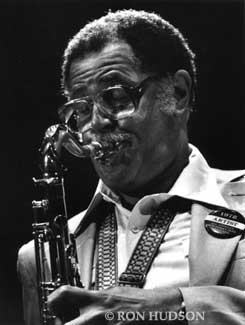| B i o g r a p h y |
 Dexter (Keith) Gordon
(February 27, 1923 - April 25, 1990) was a United States jazz tenor
saxophonist. He is considered one of the first bebop tenor players.
From 1940 to 1980, Gordon played with such jazz greats as Lionel
Hampton, Tadd Dameron, Charles Mingus, Louis Armstrong and Billy
Eckstine. He also played with the Fletcher Henderson band in Los
Angeles for a few weeks in 1947. A famous photograph by Herman Leonard
of Gordon smoking a cigarette during a set at the Royal Roost in New
York City in 1948 is one of the more iconic images in the history of
jazz.
Dexter (Keith) Gordon
(February 27, 1923 - April 25, 1990) was a United States jazz tenor
saxophonist. He is considered one of the first bebop tenor players.
From 1940 to 1980, Gordon played with such jazz greats as Lionel
Hampton, Tadd Dameron, Charles Mingus, Louis Armstrong and Billy
Eckstine. He also played with the Fletcher Henderson band in Los
Angeles for a few weeks in 1947. A famous photograph by Herman Leonard
of Gordon smoking a cigarette during a set at the Royal Roost in New
York City in 1948 is one of the more iconic images in the history of
jazz.
Gordon was a virtuoso particularly famous for his titanic saxophone
duels with fellow tenorman Wardell Gray, that were a popular live
attraction and that were documented in several albums between 1947 and
1952.
Many would characterise Gordon's sound as being 'large' and spacious
(a feature partially owed to his physical stature), and his tendency to
play behind the beat is discernible. One of his major influences was
Lester Young. Gordon, in turn, was an early influence on John Coltrane
during the 1940s and 1950s. Coltrane's playing, however, during his
early period from the mid to late '50s or early '60s influenced
Gordon's playing from then onward. Similarities in their styles include
their clear, strong, metallic tones, their tendencies to bend up to
high notes, and their abilities to single-tongue and still swing. One
of Gordon's idiosyncrasies was to recite the lyrics of each ballad
before playing it.
Gordon was composer, musician, and actor for the play 'The
Connection' in 1960. After that, he spent 15 years in Europe, mostly in
Paris and Copenhagen. Gordon played regularly with fellow expatriate
jazzmen such as Bud Powell, Freddie Hubbard, Bobby Hutcherson, Kenny
Drew, Horace Parlan and Billy Higgins. He also visited the States
occasionally for recording dates, resulting in several albums being
released under his name. Generally, the seven albums Gordon recorded
for Blue Note Records in the 1960s (Doin' Alright, Dexter Calling...,
Go, A Swingin' Affair, Our Man in Paris, One Flight Up, and Gettin'
Around) are regarded as his finest sessions. Less well-known, but of
similar quality, are the albums he recorded during the same period for
the Danish label SteepleChase (Something Different, Bouncin' With Dex,
and a few dozen others). They feature American sidemen but also such
Europeans as Spanish pianist Tete Montoliu and Danish bassist
Niels-Henning Ørsted Pedersen.
Gordon finally returned to the United States for good in 1976, and
appeared at the Village Vanguard, NY, for a gig that was dubbed as his
'homecoming'. He noted 'There was so much love and elation; sometimes
it was a little eerie at the Vanguard. After the last set they'd turn
on the lights and nobody would move'. After this appearance, Gordon
recorded several more albums that proved he was as good if not better
than before his years in Europe, and he finally gained appreciation as
one of the great jazz tenors. The increased attention that he received
because of Columbia Records promotions has been seen as a turning point
in jazz because they focused on acoustic jazz rather than the
commercial cross-over styles which had been heavily promoted during the
first part of the 1970s.
Gordon made several notable film appearances. The first occurred,
oddly enough, while he was in prison for possession of heroin. He
portrayed an inmate playing in the prison band in Unchained, though the
soundtrack was later overdubbed. In 1986, Gordon starred in the movie
'Round Midnight as 'Dale Turner', an expatriate jazz musician much like
himself; the role might even be a thinly veiled biography of him,
though Lester Young and Bud Powell were its main inspirations. Gordon
received a nomination for Academy Award for Best Actor for his
portrayal. In addition, he had a non-speaking role in the film
Awakenings.
Gordon is a member of the Jazz Hall of Fame, and was voted musician of the year by Down Beat magazine in 1978 and 1980.